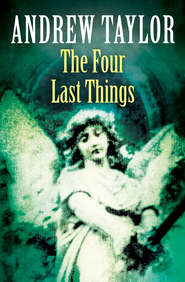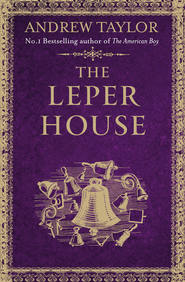По всем вопросам обращайтесь на: info@litportal.ru
(©) 2003-2024.
✖
The Scent of Death
Автор
Год написания книги
2018
Настройки чтения
Размер шрифта
Высота строк
Поля
To the south, towards Fort George at the tip of the island, a party of prisoners of war were working with picks and shovels, strengthening the embankment along the shore. A small detachment of Hessians watched over them, though without much interest. There was nowhere for the prisoners to run to and, besides, most of them were in no condition to run anywhere.
At the wharf were more guards, part-time Provincials drunk with their petty authority. I showed the sergeant in charge my passes, one from Headquarters, the other from Townley, and his arrogance modulated swiftly to something approaching servility.
‘Where do you keep the bodies you take from the water?’ I asked. ‘I want to see one of them.’
He laughed. ‘A body, sir? We can show you a fair few of those. We keep them for a day or two, and if no one claims them they go with the others.’
‘What others?’
The sergeant pointed his staff at the prisoners at work on the embankment. ‘They pack the rebel dead into the foundations. Saves all of us a deal of work.’
‘You mean they put dead prisoners there? Under the new embankment?’
‘Yes, sir – and the ones from the water, like I said, assuming they’re not claimed. Might as well do something useful with them, eh?’
‘I wish to inspect the body of a boy,’ I said. ‘His name’s Taggart. Mr Townley’s man has already looked at him.’
‘Ah, yes – that little negro. Over here, sir.’ He led the way towards a warehouse built into the gently sloping ground away from the water. ‘We keep them down the end,’ he said over his shoulder. ‘It’s cooler.’
He unbolted a heavy door and stood aside to allow me to enter first. I found myself in a narrow chamber with a vaulted ceiling stretching across the width of the building. The room was lit by two arched openings, barred but unglazed, placed high in the walls. Below them was a bank of broad, slatted shelves.
The first thing I noticed was the smell – an unlovely compound of salt water, seaweed and decaying flesh. My gorge rose. I covered my mouth and nose with a handkerchief.
‘A man grows used to the stink,’ the sergeant said. ‘I hardly notice it now.’
I glanced about me at the shapes stacked on the shelves. The bodies had been hunched together to save space. Some were naked; others wore a ragged shirt or breeches. I knew that anything worth taking would have been plundered before they were brought here.
‘It’s that one.’ The sergeant poked a mottled arm with his staff. ‘Came in the day before yesterday.’
The small body lay on its side with its back to us.
‘I want to see the face,’ I said.
The sergeant seized the upper arm by the wrist. He tugged it. The body did not move. He grinned at me, spat on his hands and braced his leg against the brick support of the shelves.
‘He’s being a little contrary, sir. But not for long.’
He took the corpse’s arm with both hands and wrenched it violently towards him. There was a sucking, squelching sound. The upper part of the body twisted. The corpse was now on its back, though its legs were still angled away from us. The smell worsened.
The head faced upwards. The sergeant took hold of it by the nearer ear and pulled it closer to the edge of the shelf.
‘That suffice, sir? I can stretch him out if you want.’
‘No need, thank you.’ I forced myself to look at the face. The eyes had gone. I swallowed hard.
‘The one you’re looking for?’ the sergeant asked.
‘Yes.’
There was no doubt about it. It was the mulatto boy I had encountered twice before. He was smaller than I remembered, and perhaps younger – no more than nine or ten. He was very thin, the ribs as clearly defined as the ridges on a fluted column; and there were faded weals on his side where he had been beaten, probably with a rope’s end, but not recently.
‘How long had he been in the water?’
‘A day or two, sir, maybe less. Don’t take long for the fish to get the eyes. Minutes, sometimes.’
Here was the informer who, according to Noak, had brought about Virgil’s death on the gallows. I had seen him twice before, though I had not known his name. On the first occasion, the day of my arrival, the boy had been leading a goat close to the spot where they had found Pickett’s body. The second time, he had been selling goat meat outside the barracks on the morning when they hanged a man for Pickett’s murder.
I straightened up. ‘Have you had any other bodies lately?’
‘A rebel prisoner on Sunday. He’d been in the water for a week or two.’
‘What about a big negro with a long scar on either side of his nose?’
‘No one like that, sir, not to my recollection.’ The sergeant gestured at the boy on the shelf. ‘Seen enough?’
‘Yes. I’m obliged to you.’
‘Do you want me to hold him here for Major Marryot to see?’
I shook my head. What was the point, after all? Marryot would laugh at me.
The sergeant pushed the body back on to its side and rubbed his hands on his coat. ‘Runaway, was he?’
‘I don’t know,’ I said. ‘Perhaps he was running from something.’
‘And then it caught up with him,’ the sergeant said.
Chapter Eighteen
Early in November, I saw the little girl for the first and last time.
I had just dined with the Commandant and a considerable company of gentlemen, most of them in uniform. There had been much food and many toasts. I was a little drunk, and therefore disposed to be emotional.
As I strolled along, Lizzie was in my mind, which was perhaps why I noticed the child in the first place. The thought of my daughter aroused a host of feelings in me – love, of course, and a sort of hunger for her company, and also anxiety: suppose she fell ill? Suppose her mother or her aunt treated her cruelly? Suppose I were to die, leaving her penniless and unprotected in this harsh and unforgiving world? Suppose the unthinkable, that Lizzie herself should die?
It was still early in the evening and Broadway was crowded. It was dark. There were a few streetlights, and the lighted windows and shop doorways. But these emphasized the gloom rather than dispelled it. That was when I saw the child.
The girl was younger than Lizzie and was in leading strings. She was with a woman. The two of them had emerged from a haberdasher’s shop about twenty or thirty yards in front of me. Both were muffled against the weather in long cloaks with hoods over their heads. The woman tugged the girl along, almost pulling her off her feet. The child had not yet learned how to walk quickly without falling over. She strained against the harness that held her as if bursting to escape.
In a moment they passed a pastry-cook’s shop – a large and brightly lit establishment with two big windows. The child was distracted by the smells and the warmth. She pulled her reins free from the woman’s hand and darted towards the open door.
The woman caught her in an instant. She hooked her arm around the girl’s waist and spun her, legs kicking, into the air. The movement dislodged the hoods from their heads.
The scene was as brightly lit as a stage. I saw the child in profile, her arms outstretched towards the pastry-cook’s, her mouth open in a howl of frustration. She was a negro, as was the woman who had charge of her.
In that same moment, alerted by my footsteps, the woman looked in my direction. To my surprise, I recognized Miriam, Mrs Arabella’s maid.
The scene dissolved. Miriam walked rapidly away, almost at a run, still with the kicking, wailing child in her arms. I called out. She did not turn round. A porter staggered out of the furniture shop next door with his arms wrapped around a large wing armchair, which stopped me dead in my tracks and blocked my view.











